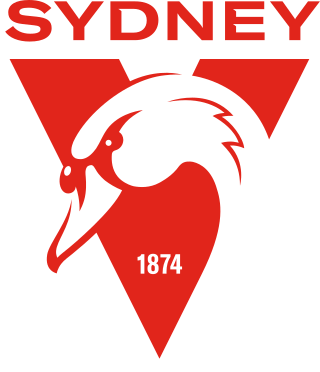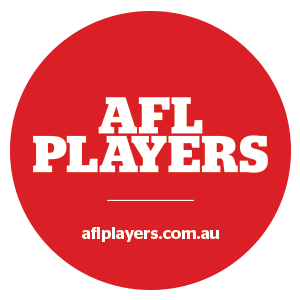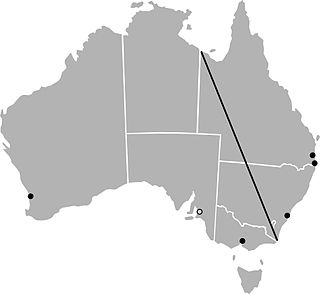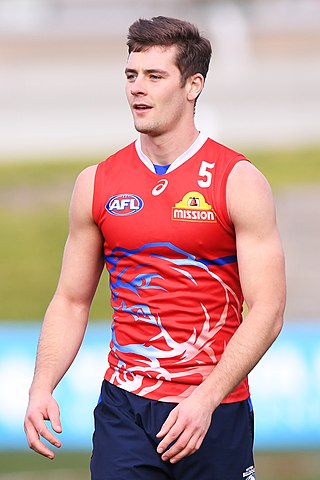
The Sydney Swans are a professional Australian rules football club based in Sydney, New South Wales. The men's team competes in the Australian Football League (AFL), and the women's team in the AFL Women's (AFLW). The Swans also field a reserves men's team in the Victorian Football League (VFL). The Sydney Swans Academy, consisting of the club's best junior development signings, contests Division 2 of the men's and women's underage national championships and the Talent League.
The 2005 AFL season was the 109th season of the Australian Football League (AFL), the highest level senior Australian rules football competition in Australia, which was known as the Victorian Football League until 1989. The season featured sixteen clubs, ran from 24 March until 24 September, and comprised a 22-game home-and-away season followed by a finals series featuring the top eight clubs.

Paul Roos is a former Australian rules football coach who coached the Sydney Swans and Melbourne Football Club in the Australian Football League (AFL). As a player, he represented Fitzroy and Sydney during the 1980s and 1990s.

Darren Jolly is a former professional Australian rules footballer who played for the Melbourne Football Club, the Sydney Swans and the Collingwood Football Club in the Australian Football League (AFL). He is best known for being the ruckman in Sydney's 2005 premiership win and also Collingwood's 2010 premiership win.

Matthew Nicks is a former professional Australian Football League player and currently the senior coach of the Adelaide Football Club. He was recruited from the West Adelaide Football Club to the Sydney Swans with the 21st selection in the 1994 AFL Draft.
Andrew Schauble is a former Australian rules football player.

The AFL Players Association is the representative body for all current and past professional Australian Football League (AFL) and AFL Women's (AFLW) players.
The AFL Commission is the governing body of the Australian Football League Limited (AFL), its subsidiaries and controlled entities. Richard Goyder has been chairman since 4 April 2017, replacing Mike Fitzpatrick.

The 2006 AFL Grand Final was an Australian rules football game contested between the Sydney Swans and West Coast Eagles, held at the Melbourne Cricket Ground in Melbourne on 30 September 2006. It was the 110th annual grand final of the Australian Football League, staged to determine the premiers for the 2006 AFL season. The match, attended by 97,431 spectators, was won by West Coast by a margin of one point, marking the club's third premiership victory.

The Barassi Line is an imaginary line in Australia which approximately divides areas where Australian rules football or rugby league is the most popular football code. The term was first used by historian Ian Turner in his 1978 Ron Barassi Memorial Lecture. Crowd figures, media coverage, and participation rates are heavily skewed in favour of the dominant code on both sides. Non-football sports in Australia do not share this separation; for instance, Australian cricket has maintained consistent interest nationally for its entire history.

The 1996 AFL Grand Final was an Australian rules football game contested between the North Melbourne Football Club and the Sydney Swans, held at the Melbourne Cricket Ground in Melbourne on 28 September 1996. It was the 100th annual Grand Final of the Australian Football League, staged to determine the premiers for the 1996 AFL season. The match, attended by 93,102 people, was won by North Melbourne by a margin of 43 points, marking that club's third premiership victory. North Melbourne were awarded a gold premiership cup instead of the usual silver in honour of the centenary grand final.
The history of the Tasmanian AFL bid covers a series of proposals and bids between 1987 and 2023 for a Tasmanian-based Australian rules football team in the Australian Football League and AFL Women's premierships. Eight formal proposals for a new or relocated club to represent Tasmania were made over this time, the earliest coming in 1992, while informal proposals were raised as early as 1987, when the Victorian Football League commenced its expansion to become a national competition.
Proposed VFL/AFL clubs are clubs that at various points in the history of the Australian Football League have been or were distinct possibilities but either did not or have not yet eventuated. Due to their association with the national Australian competition, they have drawn a large amount of controversy and media attention.

Sam Reid is a former Australian rules footballer who played for the Sydney Swans in the Australian Football League (AFL). He was drafted to Sydney with the 38th selection in the 2009 AFL draft, becoming a third generation footballer at AFL/VFL level. His grandfather Bruce Reid senior played for Footscray, his father Bruce Reid, for Footscray and Carlton and his uncle John Reid for Melbourne, Footscray and Sydney. He is also the younger brother of Collingwood premiership player Ben Reid.

Australian rules football on the Gold Coast, Queensland can be traced back to the Gold Coast Australian Football League that was established in 1961. The city's interest in the sport has been heavily linked to the Southport Australian Football Club, the Brisbane Football Club and more recently the Gold Coast Football Club. The highest form of the sport played on the Gold Coast is the Australian Football League's team the Gold Coast Football Club, who were admitted into the competition in 2011.
The Gold Coast Suns is a professional Australian rules football team based on the Gold Coast, Queensland. Nicknamed the Suns, the club competes in the Australian Football League and has done so since 2011.

Brodie Grundy is a professional Australian rules footballer playing for the Sydney Swans in the Australian Football League (AFL). He was previously an All-Australian and best-and-fairest winner with Collingwood, having been selected with the 18th draft pick in the 2012 AFL draft, as well as a player for Melbourne.
The 2014 AFL season was the 118th season of the Australian Football League (AFL), the highest level senior Australian rules football competition in Australia, which was known as the Victorian Football League until 1989. The season featured eighteen clubs, ran from 14 March until 27 September, and comprised a 22-game home-and-away season followed by a finals series featuring the top eight clubs.

Gillon McLachlan is an Australian sports administrator. He is the former chief executive officer of the Australian Football League (AFL). He was appointed to the role in 2014, succeeding Andrew Demetriou, having previously served as his deputy, and finished his contract at the end of the 2023 season, passing the reins to Andrew Dillon.

Joshua Dunkley is an Australian rules footballer who plays for the Brisbane Lions in the Australian Football League (AFL).













